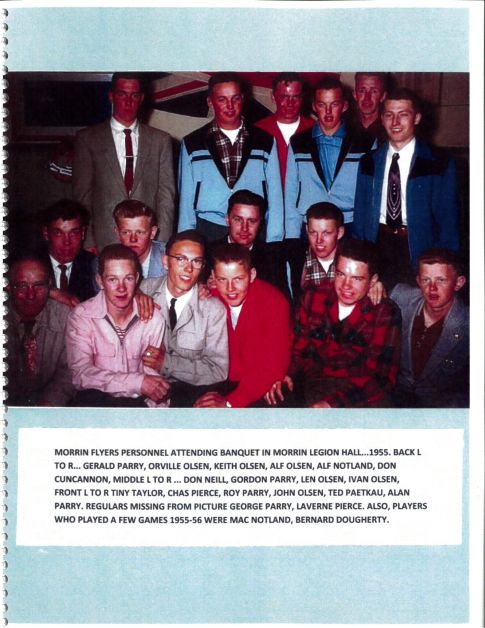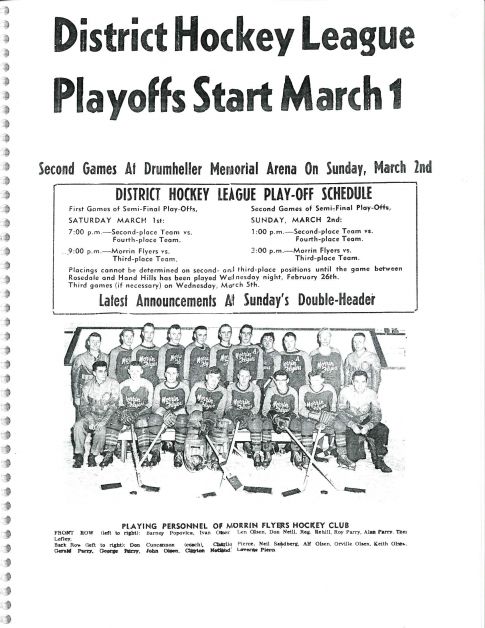
For many young men and women growing up on the prairie, lifelong memories are made on the ice with a stick and a puck.
For Don Cuncannon, hockey was part of his life growing up in Morrin, and while his playing days have long since passed, he collected his memories in a book to be shared with the community.
“I enjoyed doing it, and that was the good part. I was happy to have so many things I kept over 70 years,” he tells the Mail. “I had put them away in an old chocolate box.”
He explains his wife passed away in 2017, and the next year he and his son moved into a condo. During the move, he came across the box. When the pandemic hit, he was looking for projects and dug out the chocolate box. Along with his box of memories, his uncle Ossie Parry had a collection of 3,500 slides he had taken over the years. Parry was a very successful businessman in Morrin, who at one time was one of the only farm machinery dealers in Canada that had Minneapolis and Oliver and Massey Harris. His son Alan still had the photos and allowed Cuncannon to go through the slides, and he saved more than 1,000 on memory sticks.
“That’s how I started to make that book. I started to make one for myself, and I thought, ‘I know all the players that are still with us would like to have one,’ so it just kept going,” he said. “It grew up to 65 pages, and I had no idea it would do that when I started.”
“I made it because my daughter said, ‘Dad, when we go to the homecoming, you need to have it there.’”
The book features a collection of rare photographs, as well as clippings from game programs and extensive coverage in The Drumheller Mail.

He was just a youngster when World War II hit, but he played on school teams. He said there was nothing really organized.
Following the War, the Morrin Legionnaires Club was formed in 1946.
It was a men’s team after they came back from the War. “I was just a kid, well there were three of us who were just kids, and we got a place on that team,” said Cuncannon.
Orkney and Michichi had a team. They continued through to the 1948-1949 season. It was competitive hockey, with Michichi winning the Starland Hockey League in 1947, Orkney in
1948, and finally Morrin in 1949. All the games were on outdoor rinks when the weather allowed.
When he went to SAIT, he had a tryout with Calgary Buffaloes and made it. He was married and returned to Morrin, where he worked in the county office for nine years before he struck out in business, with insurance and accounting.
Back in Morrin, he kept involved, not as a player but more as a manager for the Morrin Flyers, with coach Tiny Taylor.
“We weren’t a tough hockey team, but we were a good hockey team. Beiseker was rough and tough, but we had better skaters,” he said.
The Morrin Flyers played in the Drumheller District Hockey League, which also included McLean’s Monarchs, the Rosedale Broncs, East Coulee, Hand Hills, Rockyford, Beiseker, and Michichi.
The Flyers were a competitive team, and in the 1954-55 season, they were finalists, but in the 1955-56 campaign, they topped the McLean Monarchs. In the 1956-57 season, the Flyers came second to the Rosedale Broncs, who were coached by RCMP officer Bill Cutts. The next year the Flyers topped the Broncs for the trophy.
In 1959, the Flyers were beaten by the Monarchs, who were led by Ronnie Loughlin and Jack Samuel.
That was the last season Cuncannon had much involvement with the Flyers. He was grateful to the City of Drumheller for allowing them to play, and also approached the coverage from John Anderson who would write the game updates for The Drumheller Mail.
“A lot of the guys were moving away, so that was our last year. They did return a decade later; they played a reunion game in 1968.
The memories linger. He recalled a couple of years ago, he was at the casino at Cross Iron Mills. He ended up sitting next to a player from Beiseker, and they reminisced about their playing days. He sent one of the books to him.
He sold his business in Morrin and moved to Calgary in 1971. This was so his children could go to University. He still has deep roots in Morrin, and is working with the community as they work on opening a new museum in the Former United Church, making shadow boxes.
“I would go back two or three times a year, but with COVID we don’t go out as much. A big part of my life is Morrin,” he said.



























